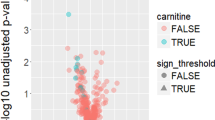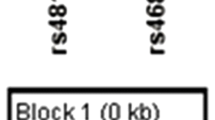Abstract
The catechol-O-methyl transferase (COMT) 158Val/Met variant has been suggested to play a role in COMT function. Epigenetic regulation of COMT may further influence the prevalence of metabolic syndrome in these patient populations. This study examined the correlation between COMT promoter methylation and metabolic syndrome in schizophrenia patients receiving atypical antipsychotic (AAP) therapy. DNA was extracted from peripheral blood samples of schizophrenia subjects screened for metabolic syndrome. Pyrosequencing was used to analyze two methylation sites of the soluble COMT (COMT-s) promoter region. Associations between AAP use, lifestyle variables, metabolic syndrome and COMT genotype with peak methylation values were analyzed. Data are reported in 85 subjects. Methylation on CpG site 1 had a mean of 79.08% (±4.71) and it was 12.43% (±1.19) on site 2. COMT genotype proved to be an indicator of COMT methylation status on site 1 (F(2, 84)=5.78, P=0.0044) and site 2 (F(2, 84),=3.79, P=0.027). A significant negative correlation between physical activity and COMT promoter region methylation was found in Val/Val homozygous patients (site 1: P=0.013 and site 2: P=0.019). Those homozygous for Met/Met showed a positive correlation between promoter site methylation and physical activity (site 1: P=0.027, site 2: P=0.005), and between CpG site methylation and metabolic syndrome (site 1: P=0.002; site 2: P=0.001). The results of this study suggest that COMT promoter region methylation is largely influenced by COMT genotype and that physical activity plays a significant role in epigenetic modulation of COMT.
This is a preview of subscription content, access via your institution
Access options
Subscribe to this journal
Receive 6 print issues and online access
$259.00 per year
only $43.17 per issue
Buy this article
- Purchase on Springer Link
- Instant access to full article PDF
Prices may be subject to local taxes which are calculated during checkout



Similar content being viewed by others
References
Ford ES, Giles WH, Dietz WH . Prevalence of the metabolic syndrome among US adults: findings from the third National Health and Nutrition Examination Survey. JAMA 2002; 287: 356–359.
Grundy S, Cleeman J, Daniels S, Donato K, Eckel R, Franklin B et al. Diagnosis and management of the metabolic syndrome: an American Heart Association/National Heart, Lung, and Blood Institute scientific statement: Executive Summary. Crit Pathw Cardiol 2005; 4: 198–203.
Nasrallah HA, Meyer JM, Goff DC, McEvoy JP, Davis SM, Stroup TS et al. Low rates of treatment for hypertension, dyslipidemia and diabetes in schizophrenia: data from the CATIE schizophrenia trial sample at baseline. Schizophr Res 2006; 86: 15–22.
Ellingrod VL, Taylor SF, Dalack G, Grove T, Bly MJ, Brook R et al. Risk factors associated with metabolic syndrome in bipolar and schizophrenia subjects treated with antipsychotics: the role of folate pharmacogenetics. J Clin Psychopharmacol (in press).
van Winkel R, Rutten BP, Peerbooms O, Peuskens J, van Os J, De Hert M . MTHFR and risk of metabolic syndrome in patients with schizophrenia. Schizophr Res 2010; 121: 193–198.
Ellingrod VL, Miller DD, Taylor SF, Moline J, Holman T, Kerr J . Metabolic syndrome and insulin resistance in schizophrenia patients receiving antipsychotics genotyped for the methylenetetrahydrofolate reductase (MTHFR) 677C/T and 1298A/C variants. Schizophr Res 2008; 98: 47–54.
Bruder GE, Keilp JG, Xu H, Shikhman M, Schori E, Gorman JM et al. Catechol-O-methyltransferase (COMT) genotypes and working memory: associations with differing cognitive operations. Biol Psychiatry 2005; 58: 901–907.
Hosak L . Role of the COMT gene Val158Met polymorphism in mental disorders: a review. Eur Psychiatry 2007; 22: 276–281.
Bilder R, Volavka J, Lachman H, Grace A . The catechol-O-methyltransferase polymorphism: relations to the tonic-phasic dopamine hypothesis and neuropsychiatric phenotypes. Neuropsychopharmacology 2004; 29: 1943–1961.
Lotta T, Vidgren J, Tilgmann C, Ulmanen I, Melen K, Julkunen I et al. Kinetics of human soluble and membrane-bound catechol O-methyltransferase: a revised mechanism and description of the thermolabile variant of the enzyme. Biochemistry 1995; 34: 4202–4210.
Nieratschker V, Frank J, Muhleisen TW, Strohmaier J, Wendland JR, Schumacher J et al. The catechol-O-methyl transferase (COMT) gene and its potential association with schizophrenia: findings from a large German case-control and family-based sample. Schizophr Res 2010; 122: 24–30.
Okochi T, Ikeda M, Kishi T, Kawashima K, Kinoshita Y, Kitajima T et al. Meta-analysis of association between genetic variants in COMT and schizophrenia: an update. Schizophr Res 2009; 110: 140–148.
Goldman D, Weinberger DR, Malhotra AK, Goldberg TE . The role of COMT Val158Met in cognition. Biol Psychiatry 2009; 65: e1–e2, author reply e3-4.
Mill J, Dempster E, Caspi A, Williams B, Moffitt T, Craig I . Evidence for monozygotic twin (MZ) discordance in methylation level at two CpG sites in the promoter region of the catechol-O-methyltransferase (COMT) gene. Am J Med Genet B Neuropsychiatr Genet 2006; 141B: 421–425.
Andreasen NC, Pressler M, Nopoulos P, Miller D, Ho BC . Antipsychotic dose equivalents and dose-years: a standardized method for comparing exposure to different drugs. Biol Psychiatry 2010; 67: 255–262.
Orrell A, Doherty P, Miles J, Lewin R . Development and validation of a very brief questionnaire measure of physical activity in adults with coronary heart disease. Eur J Cardiovasc Prev Rehabil 2007; 14: 615–623.
Abdolmaleky HM, Cheng KH, Faraone SV, Wilcox M, Glatt SJ, Gao F et al. Hypomethylation of MB-COMT promoter is a major risk factor for schizophrenia and bipolar disorder. Hum Mol Genet 2006; 15: 3132–3145.
Murphy BC, O'Reilly RL, Singh SM . Site-specific cytosine methylation in S-COMT promoter in 31 brain regions with implications for studies involving schizophrenia. Am J Med Genet B Neuropsychiatr Genet 2005; 133B: 37–42.
Singh SM, McDonald P, Murphy B, O'Reilly R . Incidental neurodevelopmental episodes in the etiology of schizophrenia: an expanded model involving epigenetics and development. Clin Genet 2004; 65: 435–440.
Tunbridge EM, Harrison PJ, Warden DR, Johnston C, Refsum H, Smith AD . Polymorphisms in the catechol-O-methyltransferase (COMT) gene influence plasma total homocysteine levels. Am J Med Genet B Neuropsychiatr Genet 2008; 147B: 996–999.
Vizzardi E, Bonadei I, Zanini G, Frattini S, Fiorina C, Raddino R et al. Homocysteine and heart failure: an overview. Recent Pat Cardiovasc Drug Discov 2009; 4: 15–21.
Ueland PM, Hustad S, Schneede J, Refsum H, Vollset SE . Biological and clinical implications of the MTHFR C677T polymorphism. Trends Pharmacol Sci 2001; 22: 195–201.
Ursini G, Bollati V, Fazio L, Porcelli A, Iacovelli L, Catalani A et al. Stress-related methylation of the catechol-O-methyltransferase Val 158 allele predicts human prefrontal cognition and activity. J Neurosci 2011; 31: 6692–6698.
Dempster EL, Pidsley R, Schalkwyk LC, Owens S, Georgiades A, Kane F et al. Disease-associated epigenetic changes in monozygotic twins discordant for schizophrenia and bipolar disorder. Hum Mol Genet 2011; 20: 4786–1496.
Pijl H . Reduced dopaminergic tone in hypothalamic neural circuits: expression of a “thrifty” genotype underlying the metabolic syndrome? Eur J Pharmacol 2003; 480: 125–131.
Christine G . Optimal physical performance in athletes: key roles of dopamine in a specific neurotransmitter/hormonal mechanism. Mech Ageing Dev 1995; 84: 83–102.
Xu Q, Ma JZ, Payne TJ, Li MD . Determination of methylated CpG sites in the promoter region of catechol-O-methyltransferase (COMT) and their involvement in the etiology of tobacco smoking. Front Psychiatry 2010; 1: 16.
Dawling S, Roodi N, Mernaugh RL, Wang X, Parl FF . Catechol-O-methyltransferase (COMT)-mediated metabolism of catechol estrogens: comparison of wild-type and variant COMT isoforms. Cancer Res 2001; 61: 6716–6722.
Lorentzon M, Eriksson AL, Nilsson S, Mellstrom D, Ohlsson C . Association between physical activity and BMD in young men is modulated by catechol-O-methyltransferase (COMT) genotype: the GOOD study. J Bone Miner Res 2007; 22: 1165–1172.
Stroth S, Reinhardt RK, Thone J, Hille K, Schneider M, Hartel S et al. Impact of aerobic exercise training on cognitive functions and affect associated to the COMT polymorphism in young adults. Neurobiol Learn Mem 2010; 94: 364–372.
Tunbridge EM . The catechol-O-methyltransferase gene: its regulation and polymorphisms. Int Rev Neurobiol 2010; 95: 7–27.
Acknowledgements
We acknowledge the subjects who participated in this research, the Washtenaw Community Health Organization (WCHO) and the Detroit-Wayne County Community Mental Health Agency (D-WCCMHA). Last, we acknowledge Dr Richard Pilsner who provided guidance with the methylation assay. The following funding sources were utilized for this publication: NIMH (R01 MH082784) and the NIH-NCCR for the Michigan Institute for Clinical and Health Research (MICHR UL1RR024986) and the Chemistry Core of the Michigan Diabetes Research and Training Center (NIH5P60 DK 20572).
Author information
Authors and Affiliations
Corresponding author
Ethics declarations
Competing interests
The authors declare no conflict of interest.
Rights and permissions
About this article
Cite this article
Lott, S., Burghardt, P., Burghardt, K. et al. The influence of metabolic syndrome, physical activity and genotype on catechol-O-methyl transferase promoter-region methylation in schizophrenia. Pharmacogenomics J 13, 264–271 (2013). https://doi.org/10.1038/tpj.2012.6
Received:
Revised:
Accepted:
Published:
Issue Date:
DOI: https://doi.org/10.1038/tpj.2012.6
Keywords
This article is cited by
-
Altered DNA methylation of CYP2E1 gene in schizophrenia patients with tardive dyskinesia
BMC Medical Genomics (2022)
-
Analysis of COMT Val158Met polymorphisms and methylation in Chinese male schizophrenia patients with homicidal behavior
International Journal of Legal Medicine (2018)
-
Interaction between the Val158Met catechol-O-methyltransferase gene variant and second-generation antipsychotic treatment on blood pressure in children
The Pharmacogenomics Journal (2015)
-
The effect of folate supplementation and genotype on cardiovascular and epigenetic measures in schizophrenia subjects
npj Schizophrenia (2015)
-
DNA methylation in schizophrenia: progress and challenges
Science Bulletin (2015)



